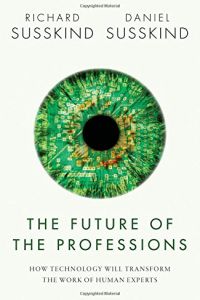Join getAbstract to access the summary!

Join getAbstract to access the summary!
Richard Susskind and Daniel Susskind
The Future of the Professions
How Technology Will Transform the Work of Human Experts
Oxford UP, 2016
What's inside?
Emerging digital technologies are profoundly changing professions like law, medicine and the clergy.
Recommendation
Legal technology expert Richard Susskind OBE and his son, Oxford economics professor Daniel Susskind, offer a lucid discussion of how technology is transforming the professional disciplines. While some of their examples – such as Wikipedia or the Khan Academy – will be familiar, others are freshly intriguing. The Susskinds methodically discuss how the technological, social, economic, psychological, ethical and emotional aspects of the professions are changing under the impact of emerging technologies. getAbstract recommends their look ahead to anyone in a professional discipline and to anyone interested in how technology is changing society.
Summary
About the Authors
Legal technology expert Richard Susskind OBE also wrote Tomorrow’s Lawyers. Daniel Susskind, an economics lecturer at Balliol College, Oxford, was a Kennedy scholar at Harvard.



















Comment on this summary